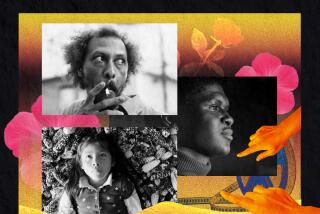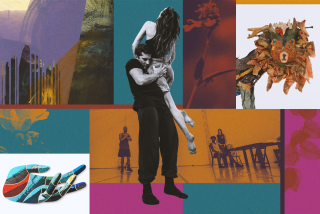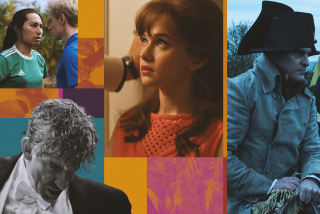A Lang Rarity Evokes Japan
- Share via
Among films screening in LACMA’s “The Architect of Destiny: Fritz Lang in Germany” is the director’s fourth film, “Harakiri” (1919), a loose adaptation of “Madame Butterfly,” based not on the Puccini opera but a David Belasco play. It was long thought lost until discovered in a Dutch film archive in the 1980s and then restored.
It is a remarkable evocation of Japan, which Lang had visited, and a stunningly beautiful film. Several years later in Hollywood, Anna May Wong and Kenneth Harlan starred in a notable two-strip Technicolor version of “Madame Butterfly,” but not surprisingly the Lang version is more distinctive.
Right from the start Lang’s brooding fatalism is palpable as Lil Dagover’s exquisite O-Take-San, daughter of a nobleman, is seduced and abandoned by Niels Prien’s naval officer. Plot developments not in the opera allow Lang to stage a richly evocative sequence set in Nagasaki’s red-light district. “Harakiri” screens Saturday at 7:30 p.m. and will be followed by “The Testament of Dr. Mabuse” (1932).
Screening tonight at 7 p.m. at UCLA’s James Bridges Theater in Melnitz Hall is Lang’s glorious two-part underworld epic, “Dr. Mabuse” (1922), in which Dagover is featured and which will be presented with live musical accompaniment by Robert Israel. LACMA: (323) 857-6177; UCLA Film Archive: (310) 206-FILM.
*
The UCLA Film Archive opens “Salt of the Earth: The Films of Ermanno Olmi” on Saturday at the James Bridges Theater with “Il Posto” (The Job), the 1961 film that launched the director’s career when he was 30. That career continues to the present but has been burdened in recent years by Olmi’s poor health. This series is invaluable because the director of “The Tree of Wooden Clogs” and other key works in the neo-realist tradition has long been absent from American screens.
After 40 years “Il Posto” remains a triumph, a prescient satire on the dehumanizing quality of modern corporate life that stings all the more for being so gentle and good-humored. Sandro Panzeri plays a young man from one of the small towns that ring Milan, a magnet for jobs. He is one of many who apply for a position in a large company but ends up taking an office-boy job with the possibility of moving up to some kind of accounting clerk. His spirits are lifted when he meets a young woman (Loredana Deffo, subsequently Olmi’s wife) who lands a place in the steno pool, which alas places her in a different building and on a different lunch schedule from Panzeri. While the company cannot completely stifle human warmth, “Il Posto” suggests that even should Panzeri land a secure slot for himself in the company he would be likely to be trapped for life in a dull, repetitious job with no hope of advancement or professional fulfillment. (310) 206-FILM.
*
Also screening Saturday at 5 p.m. at the Music Hall in Beverly Hills is Peter Gothar’s engaging, rueful comedy, “Passport,” as part of the fourth annual Hungarian Film Festival of Los Angeles, which runs Friday through next Thursday at the theater at 9036 Wilshire Blvd. The Eastern Europeans are masters at wistful, bleak humor, an understandable reflection of their turbulent, often brutal history.
On a farm in Hungary near the border with the Ukraine a drab unmarried woman, Mari (Mari Nagy), has started writing letters to an acquaintance, Elizaveta (Eniko Borcsok), in a small Ukrainian town. Mari is writing as her younger brother Jozsi (Gergely Kocsis), who is proposing marriage. As Elizaveta, who works at a brick factory, is 33 and unmarried, she eagerly accepts, for it is common knowledge in the Ukraine that “life is better in Hungary.”
Jozsi goes along with his sister’s ploy and travels to Elizaveta’s town to marry her and bring her back to the farm. What Elizaveta doesn’t realize when Jozsi becomes falling-down drunk at their wedding is that he is an alcoholic and that Mari had been hoping marriage would cure him. Not surprisingly, Jozsi only grows worse, but he doesn’t reckon with the fact that he’s married to a born survivor, a sturdy, resilient woman unafraid to take charge of her own destiny. Festival information: (818) 848-5902; Music Hall show times: (310) 274-6869.
*
In the first few moments of the California Science Center’s latest Imax offering, there is the feeling that they’ve got the wrong film up there on the giant screen. But no, what looks like the sands of Sahara is a naked body with its bellybutton looking like a volcanic crater. Written by Richard Dale and directed by Peter Georgi, the 43-minute “The Human Body,” which opens Sunday, is quite a trip, as we are taken down the digestive system, the lungs and even inside the heart, which looks like a vaulted, multi-columned chamber in a Gothic church.
These are just a few of the amazing sights, which include a teenage boy, bicycling to school, photographed with an X-ray camera that shows only his skeleton pedaling away. Since this a family film, it deals with reproduction and puberty without reference to sex. So when it shows a swarm of sperm swimming up a woman’s Fallopian tubes in search of an egg to fertilize--to the tune of Marvin Gaye’s “Let’s Get It On” (!)--there’s no indication of how the sperm got started on their journey.
“The Human Body” is loosely framed by its depiction of an upscale young family awaiting the birth of a baby. 700 State St., L.A. (213) 744-7400.
*
Other notable screenings:
Lane Wyrick’s “The Nazi Drawings,” a documentary on graphics art pioneer Mauricio Lasansky’s series of images of Holocaust horrors, will premiere Sunday at 5:30 p.m., following a reception, at the Directors Guild, 7920 Sunset Blvd. After the screening ABC news correspondent Judy Muller will talk with Lasansky and Wyrick. Reservations required: (323) 938-5325. The 25-minute film will begin a one-week Academy Award-qualifying run Oct. 19 at a Laemmle theater yet to be determined.
Three short films in the first annual Native American Film and Television Alliance Film Festival will screen tonight at 7 at the Gene Autry Western Heritage Museum. (323) 667-2000.
A new 35-millimeter print of Josef von Sternberg’s “The Blue Angel” (1930) begins a one-week run Friday at the Nuart, 11272 Santa Monica Blvd., West L.A. (310) 478-6379.
The UCLA Documentary Salon will present on Monday at 7:30 p.m. in the James Bridges Theater “An Evening with Alan Berliner,” featuring three of the filmmaker’s venturesome documentaries; Berliner holds a workshop at the Bridges on Sunday from 2 to 6 p.m. (310) 206-8365.
“Documental,” the fifth annual 12-day International Documentary Film Festival, opens Wednesday at 7 p.m. at Monica 4-Plex, 1332 2nd St., Santa Monica, with Jan Harlan’s “Stanley Kubrick: A Life in Pictures.” (213) 534-3600, Ext. 7438.
More to Read
The biggest entertainment stories
Get our big stories about Hollywood, film, television, music, arts, culture and more right in your inbox as soon as they publish.
You may occasionally receive promotional content from the Los Angeles Times.










